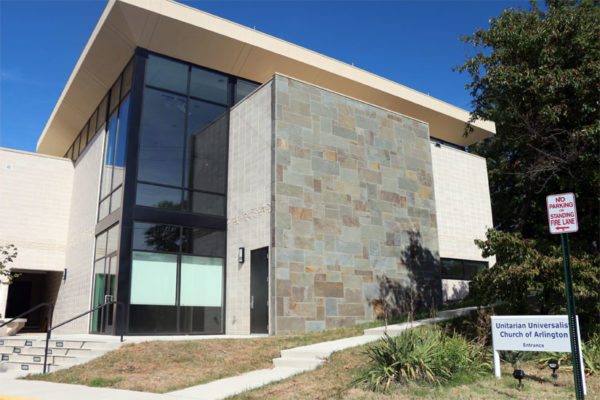Demonstrators will line George Mason Drive near Route 50 tonight to protest in support of Black Lives Matter.
The peaceful protest, organized by the Unitarian Universalist Church of Arlington in response to the death of George Floyd at the hands of Minneapolis police, is set to take place from 5-6 p.m. Monday.
More from an event page:
Please join UUCA in creating a line of witness along George Mason Dr (4444 Arlington Blvd, Arlington, VA) on Monday, June 1, from 5-6pm. We will gather in the church parking lot. Please note, the church building will not be open.
We wish to observe safe social distancing so we will be standing six feet apart simply holding up signs of support. Please feel free to make your own sign, or you may pick up signs in the church parking lot. Please pass the word along to anyone you know who may wish to join us.
We have a right to peaceful protest, but we must be respectful of people on the sidewalks and not create a barrier. Recognize that you are joining what could be a risky situation and make personal choices as you see fit.
The event page also includes the following statement from the Arlington Interfaith Network about the death of Floyds and “others killed for being black in America.”
This week, we saw the murder of George Floyd. We say the name of Ahmaud Arbery, Breonna Taylor, Eric Garner, Philando Castile, Jordan Davis, and so many others killed for being black in America.
Our diverse faith traditions share a common belief in the integrity of human life.
We share a practice of lament for the places where people cry out. We share a hope that our collective actions can point us to a better, more whole world.
The Arlington Interfaith Network writes in recognition of the “original sin” of racism that built this country from slave labor and dominion over Native lives.
We recognize that the systems that govern us every day and the way our society is arranged perpetuates injustice. We recognize that white supremacy is something that all of us with privilege participate in daily.
We write in knowing that faith communities with privilege need to use their place to have sacred conversations on race and work for real change.
We write in recognition of the pain that clergy of color minister hold continually and that all in their communities bear in a particular way.


